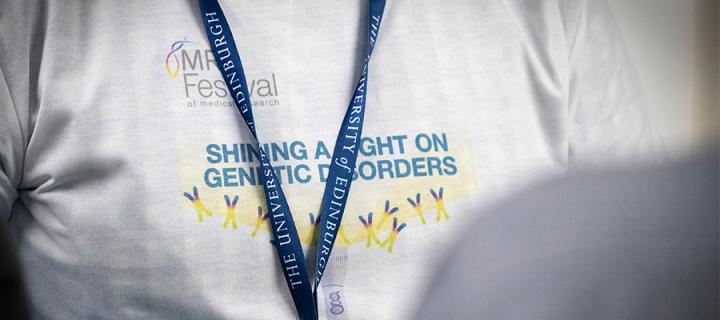Shining a Light on Genetic Disorders
On 18 June the public joined researchers, clinicians and patients at the MRC Institute of Genetics & Molecular Medicine for ‘Shining a Light on Genetic Disorders’, part of this year’s MRC Festival of Medical Research: June 2019

With a focus on colorectal cancer and Aicardi-Goutières syndrome, the evening celebrated the power of partnerships in medical research through inspiring and informative presentations by clinical researchers and families affected by genetic conditions.
Opened by Professor Wendy Bickmore, Director of the MRC Human Genetics Unit, this MRC IGMM event was compered by Hazel Lambert, Public Engagement with Research Manager at the College of Medicine & Veterinary Medicine.
Miss Farhat Din (Cancer Research UK Edinburgh Centre), Clinical Consultant and Research Scientist and one of her patients, alongside Senior Scientist Dr Susan Farrington (Cancer Research UK Edinburgh Centre), shared their personal perspectives about Bowel Cancer. As John Scott MSP was unable to present, he sent a video message about Lynch Syndrome, a rare a genetic bowel condition. Clinical geneticist Professor Yanick Crow (Centre for Genomic & Experimental Medicine), and the father of one of his patients provided their personal perspectives of Aicardi-Goutières syndrome (AGS).
The presenters were then joined by Natalie Frankish from the Genetic Alliance UK and Carol Porteous, Patient and Public Involvement Advisor from the University’s Edinburgh Clinical Research Facility for a wide ranging discussion.
The 140 participants continued their conversations at the drinks and canapés reception in the Nucleus - the IGMM common area, where they engaged with investigators from the MRC HGU, CRUK Edinburgh Centre and CGEM who presented lay posters summarising their studies on genetic disorders. Researchers from across the institute encouraged our guests to play with a selection of drop-in activities. These included looking at cheek cells under microscope; extracting DNA from strawberries; connecting codes to cures; Mighty Mitochondria – the powerhouse of the cell and the Power of Partnerships puzzle.
On exhibition throughout the Nucleus, the display of 17 lay posters described a sample of the genetic diseases investigated within our institute, including Aicardi-Goutières syndrome (AGS); Primary ciliary dyskinesia (PCD); Hutchinson-Gilford Progeria Syndrome (HGPS) and Cornelia de Lange Syndrome (CdLS). A variety of eye conditions were presented, including Aniridia, Microphthalmia, Keratoconus and Late-Onset Retinal Degeneration (L-ORD). Other illnesses where genetic predispositions are being analysed in the MRC IGMM include Myalgic encephalomyelitis / chronic fatigue syndrome and depression. Some of the cancer types studied in the Cancer Research UK Edinburgh Centre/ IGMM presented to the visitors included ovarian, skin and colorectal (bowel) cancers. The NHS Colorectal Cancer Specialist Nursing Team from the Western General Hospital also presented a poster on their work. Finally, there were posters on ‘People Power - Scottish Population BioBanks’ and medicinal chemistry.
Congratulations on a superbly organised and executed event. It was a privilege to hear the patient stories and to gain insight from the clinicians/researchers. One of the PhD students running a drop-in activity, told me that she loves what she does in the lab each day and works hard, but having heard from the patients, she expressed a sense of greater purpose for her work and the importance of doing research that make a real difference for patients.
Too often public engagement feels like scientists just talking at people, but this event was an amazing two way dialogue between researchers and patients and their families. I think that we were all both humbled and inspired by the stories that we heard, and I think that the event was also so important in highlighting the impact of rare genetic disease.
On behalf of the family I would like to thank you for a great experience, and the invitation to share our story and the positive impact that your research has had on our family.

